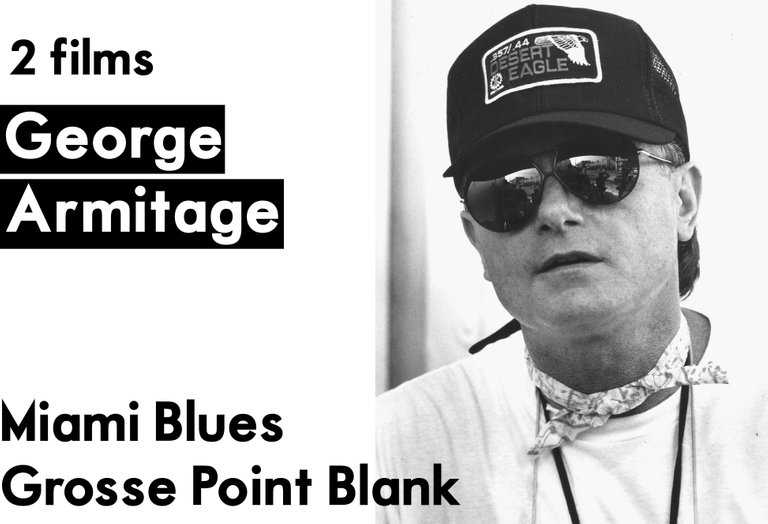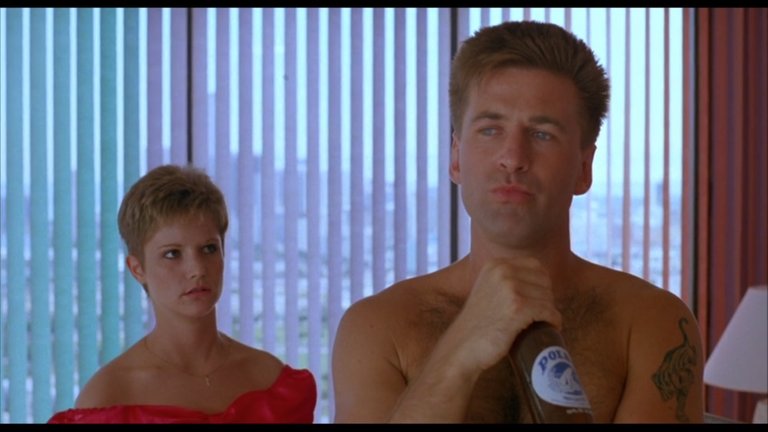
Creado por mí usando Adobe Illustrator con la imagen del director estadounidense George Armitage publicada con licencia Creative Commons
Todos sabemos que en el cine hay ciertos directores que merecen mucho más reconocimiento del que hayan podido tener durante el desarrollo de sus carreras. Así como también sabemos que entre estos desafortunados, también hay algunos realizadores brillantes que, por distintos motivos, no pudieron tener un cuerpo de trabajo tan amplio como hubiesen querido.
Es por eso que quiero hablarles -como cordial difusor de la buena palabra del cine- sobre George Armitage, un destacado director estadunidense del género de comedia negra criminal que descubrí a finales de los 90s, que creo merece ser conocido por cualquier autoproclamado expedicionario cinematográfico.
A pesar de que su carrera comenzó en los tempranos años 70, logrando hacer varios trabajos tanto en televisión como en cine, fue ya en los años 90s cuando –a mi parecer- pudo llevar a buen término un par de obras extrañas que lo elevaron como realizador de culto.
Se trata de Miami Blues de 1990, y Grosse Point Blank de 1997, donde Armitage hace un despliegue de talento como director, dominando los matices necesarios para navegar las difíciles aguas de la comedia oscura criminal y lograr el tono correcto (aunque haciendo una valoración más justa, esto lo logra mucho más en la segunda que en la primera).
Teniendo esto en cuenta, ahora sí, los invito a echar un vistazo a este par de joyas poco vistas y apreciadas por el público general, que demuestran las capacidades de este director que merece mucho más reconocimiento.
Miami Blues (1990)
Comenzamos con Miami Blues, una obra que da una vibra venida directamente de los setenta, cuando el New Hollywood reinaba campante. Se trata de la historia de Frederick J. Frenger Jr., un ex convicto sociópata y ladrón de poca monta encarnado por Alec Baldwin, quien viaja a Miami al salir de la cárcel.
Al apenas llegar, y luego de matar sin querer a un hombre en el aeropuerto, se junta con Susie Waggoner (Jennifer Jason Leigh), una tierna e inocente prostituta que aspira tener una vida doméstica idílica. La trama se complica luego de que Junior se adueña de la placa y la pistola del detective Hoke Moseley (Fred Ward), dando lugar a una impetuosa racha delictiva haciéndose pasar por agente de policía.

Fotograma de la pelicula con Jennifer Jason Leigh al fondo y Alec Baldwin sosteniendo una botella de Polar.
Dato curioso (para los venezolanos):
-Recuerdo haberme sorprendido al verla aquella primera vez en el recién estrenado canal de cable MGM, por allá en el 98-99, porque los protagonistas de la película bebían solamente cerveza Polar.
Otro dato destacable:
-La inclusión como tema principal del soundtrack de Spirit in the Sky de Norman Greenbaum.
Grosse Point Blank (1997)
Su siguiente película fue Grosse Point Blank, otra joya que cuenta la historia de a un asesino a sueldo que vuelve a su pueblo natal para asistir a la reunión aniversario de su promoción del liceo, y de paso ejecutar un golpe.
La película tiene un elenco estelar encabezada por John Cusack, que incluye a Minnie Driver, Alan Arkin, Dan Aykroyd, Jeremy Piven, Hank Azaria y Joan Cusack, la también actriz y hermana del actor protagonista.
Igualmente destacable es el soundtrack construido para este film con música pop de los 80s como Blister in the Sun de Violent Femmes, The Killing Moon de Echo & The Bunnymen, Take on Me de A-ha, Walk Like an Egyptian de The Bangles, Under Pressure de David Bowie con Queen, y 99 Luftballons de Nena, dada la naturaleza de la reunión de graduados.
Además incluye música de otras épocas como I Can See Clearly Now de Johnny Nash, Ace of Spades de Motörhead, Rudie Can't Fail de The Clash, o las más contemporáneas (para la época de su realización) Live and Let Die de Guns N' Roses, y Matador de Los Fabulosos Cadillacs.
Créditos:
Los videos vinculados desde You Tube no son de mi propiedad, solamente comparto el enlace al video del propietario. No se pretenden infringir los derechos de autor.
Utilizado bajo la sección 107 de uso justo de la Ley de Derecho de Autor de 1976 de los Estados Unidos.
Traducción al inglés por Deepl.

Created by me using Adobe Illustrator with the image of the american director George Armitage published with Creative Commons license
We all know that in cinema there are certain directors who deserve much more recognition than they may have had during the development of their careers. Just as we also know that among these unfortunate ones, there are also some brilliant filmmakers who, for various reasons, were not able to have as large a body of work as they would have liked.
That's why I want to talk to you -as a cordial spreader of the good word of cinema- about George Armitage, an outstanding American director of the criminal black comedy genre that I discovered in the late 90s, who I believe deserves to be known by any self-proclaimed cinematic expeditionary.
Although his career began in the early 70s, managing to make several works in both television and film, it was already in the 90s when -in my opinion- he was able to bring to fruition a couple of strange works that elevated him as a cult filmmaker.
These are 1990's Miami Blues, and 1997's Grosse Point Blank, where Armitage displays his talent as a director, mastering the necessary nuances to navigate the difficult waters of dark criminal comedy and achieve the right tone (although, in a fairer assessment, he achieves this much more in the latter than in the former).
With this in mind, I now invite you to take a look at this pair of gems little seen and appreciated by the general public, which demonstrate the capabilities of this director who deserves much more recognition.
Miami Blues (1990)
We begin with Miami Blues, a work that gives a vibe straight out of the seventies, when New Hollywood reigned supreme. It is the story of Frederick J. Frenger Jr., a sociopathic ex-con and petty thief played by Alec Baldwin, who travels to Miami upon his release from prison.
Upon arrival, and after inadvertently killing a man at the airport, he hooks up with Susie Waggoner (Jennifer Jason Leigh), a tender, innocent prostitute who aspires to an idyllic home life. The plot tickens after Junior gets hold of Detective Hoke Moseley's (Fred Ward) badge and gun, setting off on an impetuous criminal streak posing as a police officer.

Frame from the movie with Jennifer Jason Leigh in the background and Alec Baldwin holding a bottle of Polar beer.
Fun fact (for Venezuelans):
-I remember being surprised when I saw it for the first time on the recently launched MGM cable channel, back in 98-99, because the protagonists of the film drank only Polar beer.
Another noteworthy fact:
-The inclusion of Norman Greenbaum's Spirit in the Sky as the main theme of the soundtrack.
Grosse Point Blank (1997)
His next film was Grosse Point Blank, another gem that tells the story of a hit man who returns to his hometown to attend the anniversary reunion of his high school graduating class, and in the process execute a hit.
The film has a stellar cast headed by John Cusack, including Minnie Driver, Alan Arkin, Dan Aykroyd, Jeremy Piven, Hank Azaria and Joan Cusack, also an actress and sister of the lead actor.
Equally remarkable is the soundtrack built for this film with 80s pop music such as Blister in the Sun by Violent Femmes, The Killing Moon by Echo & The Bunnymen, Take on Me by A-ha, Walk Like an Egyptian by The Bangles, Under Pressure by David Bowie with Queen, and 99 Luftballons by Nena, given the nature of the graduate reunion.
It also includes music from other eras such as I Can See Clearly Now by Johnny Nash, Ace of Spades by Motörhead, Rudie Can't Fail by The Clash, or the more contemporary (for the time of its realization) Live and Let Die by Guns N' Roses, and Matador by Los Fabulosos Cadillacs.
Credits:
I do not own the linked videos from You Tube; I am just sharing the link to the copyright owner's video. No copyright infringement is intended.
Used under fair-use section 107 of the Copyright Act 1976.
English translation by Deepl.